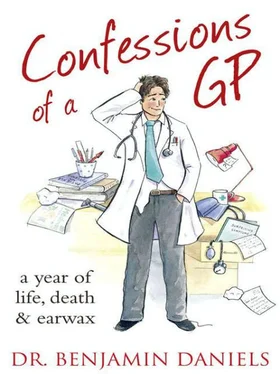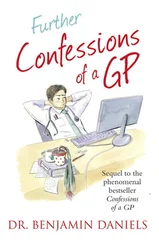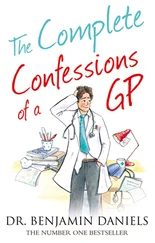Dear Doctor Daniels ,
Your patient was admitted at 03.45 with a presentation of
overdose . He was discharged with a diagnosis of death.
I felt like shit now. Had Lee overdosed on the medication I prescribed him? I hadn’t seen Lee because I was hungry and tired from a long morning surgery and didn’t want to get held up. Was that a good excuse? If I had seen him properly and listened, maybe I wouldn’t have given him the prescription at all. Perhaps he would have told me a few of his worries, felt a bit better and not topped himself. Had I missed a rare chance to make a real difference? I had an unpleasant morning stewing over Lee’s death, imagining explaining myself to the judge.
‘So Dr Daniels, the deceased came to see you feeling vulnerable and desperate. He had a history of violence and depression. You were his only source of help and what did you do next?’
‘I gave him a week’s worth of sleeping pills and told him to bugger off, your honour.’
It didn’t look good, did it?
Suicide is a difficult case for GPs to deal with. We see depression and self-harm by the truckload but not many patients actually successfully kill themselves. When I was an A&E doctor, the cubicles were full of teenage girls who had taken eight paracetamol after a row with a boyfriend or parent. There were a lot more cries for help than genuine suicide attempts and most of the ‘overdoses’ were generally dismissed by A&E doctors as time-wasters. When I was working in psychiatry we saw the next step up. These were genuinely depressed people who took big overdoses and really wanted to die at the time. They only very rarely succeeded in causing themselves any real harm and still ended up in an A&E cubicle with the casualty doctors equally reluctant to have to treat them. Only one of my patients successfully committed suicide during my time in psychiatry. He was a nice young lad of 19 who was just recovering from his first episode of schizophrenia. He had just returned from a gap year travelling round Asia and was looking forward to starting university when he became really psychotic and unwell. He was hearing voices and getting very paranoid. He had to be sectioned and admitted to the ward but he started to improve with medication. I was really pleased with his progress and happy that he was ready to be discharged home. He was realising his potential future of daily medication, psychotic relapses and social stigma. He got into his mum’s car, took off his seat belt and drove very fast into a wall. It made me appreciate that, actually, if you really do want to die it isn’t that difficult.
I felt pretty shitty when that lad died. The consultant took me aside and said that a cardiologist can’t expect to stop all his patients from ever having heart attacks, he just has to look after his patients as best he can and try to prevent as many as possible. It’s the same being a psychiatrist or GP. You can’t expect to save all your patients from suicide. If I had done everything that I could for Lee, it would have been easier to take. It was the fact that I only really gave him a second-rate service that sat with me so uncomfortably.
After stewing all morning, I phoned the local casualty department to try to find out a bit more about what had happened. The A&E registrar told me that Lee had died of a heroin overdose. Apparently, it was thought to be accidental. ‘There’s been a dodgy batch of smack going round town. Caused a bit of a junkie cull. We’ve had a few of them expire over the last few days. Still plenty more where they came from, I suppose.’
I felt a massive wave of relief wash over me. It was heroin that had killed Lee, not the diazepam I had prescribed him. Lee was still dead and I had let him down as his doctor, but I lived to fight another day. Lesson learnt, I hoped.
Would you think it was strange if your GP gave you a hug? Probably yes if you were just asking him to look at your athlete’s foot. What about if you were upset and needed some human contact?
One of the GPs near me has been suspended for the last two years for allegedly hugging his patients. He worked single-handedly for many years with no apparent problems, but two years ago, shortly after firing his receptionist, she reported him to the General Medical Council for having had ‘inappropriate contact’ with patients. A letter was sent to all his past and present patients and one or two of them then confessed that they felt he had been slightly inappropriately tactile with them over the years. Interestingly, nobody actually complained, but he was suspended and is still awaiting the conclusion of an investigation. He is an older GP, originally from Italy, and he claims that he was simply comforting upset patients. I’ve never met the doctor involved but I’ve met some of his ex-patients and they explained to me that they always assumed he was ‘just a bit Italian’ and was simply less reserved than us Brits. I have no idea if there is any truth behind the allegations, but it has made me very conscious of how I am with my patients.
I’m not sure whether there was more than meets the eye with regard to the Italian doctor, but I do think that cultural differences concerning human contact are important. I saw a very cute little three-year-old Italian girl once. She was very snotty and full of cold but basically fine. After reassuring the mum, she said to the little girl: ‘Give the nice doctor a kiss for looking after you so nicely.’ I was quite surprised. It just isn’t something we do here. I also wasn’t too pleased to receive a snotty kiss from a virus-ridden three-year-old.
There also seem to be cultural differences between nationalities with regard to women being examined by male doctors. The general rule for women appears to be that they tend to feel awkward about being intimately examined by a young male doctor until they have had a baby. It would seem that the experience of having legs akimbo and ten medical students trying to feel how dilated your cervix is provides an instant cure for ever feeling self-conscious. Eastern European women seem to feel no embarrassment about stripping off in front of the doctor. I saw a young Czech woman who needed her blood pressure taken. She was wearing a thick jumper and I couldn’t roll up her sleeve sufficiently to put the cuff round her upper arm. I asked if she could take off her jumper. She whipped it off without a care in the world and I was rather taken aback to find that she had absolutely nothing on underneath. Not even a bra. The Czech woman herself wasn’t bothered in the slightest and this was supported by her normal blood pressure reading. I dread to think how high mine had gone! Later that surgery a woman from Hong Kong came in with a lump on her back. She was absolutely horrified when I suggested that I would need to have a look and in the end I had to send her to a female GP.
I am often faced with somebody very upset and in floods of tears in front of me. They may be someone I’ve just met or perhaps a patient that I’ve known for some time and have built up a close relationship with. Regardless of this I just wouldn’t give them a hug. One of my GP friends says that he puts a consoling hand on the shoulder of his upset patients. He maintains that it is a comforting form of human contact but not too invasive. I just hand them a box of tissues and try to look sympathetic. I can’t think of anything more awkward than a patient asking me for a hug. Funnily enough, though, if they told me that they had rectal bleeding, I wouldn’t blink an eyelid about sticking my finger up their bum. Just one of those odd quirks of being a doctor, I suppose.
I had a call to visit Jackie again. She is in her late thirties and lives in a tiny two up two down council house with her three teenage children. The house is thick with smoke and painfully cramped. The TV takes up most of the lounge and lying on the sofa in front of it was Jackie.
Читать дальше
Конец ознакомительного отрывка
Купить книгу











![Benjamin Franklin - Memoirs of Benjamin Franklin; Written by Himself. [Vol. 2 of 2]](/books/747975/benjamin-franklin-memoirs-of-benjamin-franklin-wr-thumb.webp)
![Benjamin Franklin - Memoirs of Benjamin Franklin; Written by Himself. [Vol. 1 of 2]](/books/748053/benjamin-franklin-memoirs-of-benjamin-franklin-wr-thumb.webp)